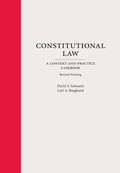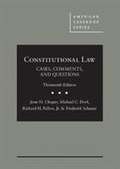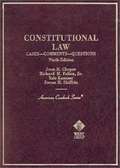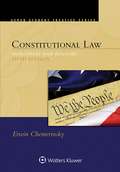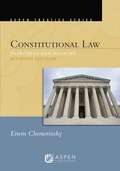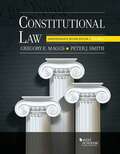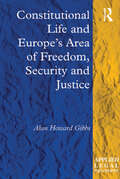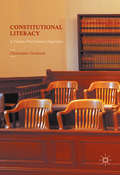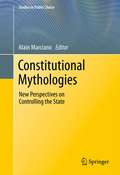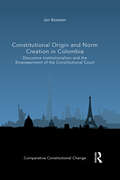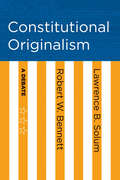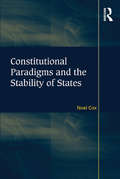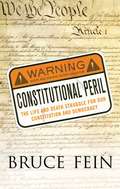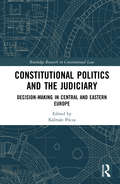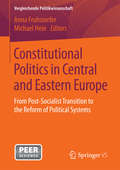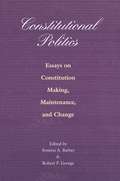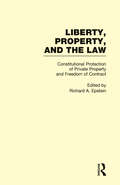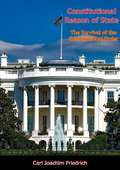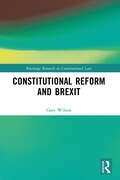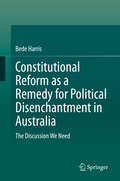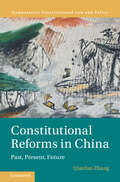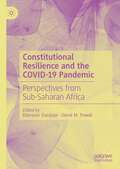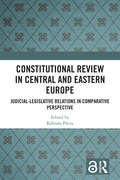- Table View
- List View
Constitutional Law: A Context and Practice Casebook
by Lori A. Ringhand David S. SchwartzThis innovative casebook takes constitutional law beyond the realm of academic theory and enables students to approach the topic as practicing attorneys as well as legal thinkers. The classic cases are presented, but instructors also are given the opportunity to use practice problems, in-depth case studies, and non-case materials to explore the richness of constitutional decision making as it actually occurs in today's world. An array of "the constitution outside the courts" materials are provided, such as opinions from the Office of Legal Counsel, Congressional debates about judicial selection, and political science scholarship about judicial decision making. A full teacher's manual with electronic teaching notes is included, as are suggested syllabi for teaching the material as either a single comprehensive course or in a two-course package separating federalism and structural issues from civil rights and liberties. This book is part of the Context and Practice Series, edited by Michael Hunter Schwartz, Professor of Law & Associate Dean for Faculty and Academic Development, Washburn University School of Law.
Constitutional Law: Cases, Comments, And Questions (American Casebook)
by Jesse H. Choper Richard H. Fallon Jr. Frederick Schauer Michael C. DorfThis long-popular constitutional law casebook has added two new co-authors for its newest new edition, Michael Dorf and Frederick Schauer, who have brought deep background and rich insight in helping to bring the book thoroughly up to date. In preparing the new edition, the authors have retained the basic format of prior editions, but have added new cases and re-edited old ones to ensure coverage of important topics in manageable numbers of pages. The Notes and Questions, which have long been a hallmark of the book, continue to present a wide range of perspectives for students to consider, rather than reflecting a single point of view that users of the book must either adopt or teach against. Professors will especially like the illuminating and provocative extracts from the literature that accompany important new cases involving the Affordable Care Act, same-sex marriage, affirmative action, and campaign finance and freedom of speech.
Constitutional Law: Cases, Comments, and Questions (9th edition)
by Jesse H. Choper Yale Kamisar Steve H. Shiffrin Richard H. Fallon Jr.Casebook for critical examination of present and potential developments in constitutional law.
Constitutional Law: Principles And Policies
by Erwin ChemerinskyRelied on by students, professors, and practitioners, Erwin Chemerinsky's popular treatise, Constitutional Law: Principles and Policies, Fifth Edition, clearly states the law and identifies the underlying policy issues in each area of constitutional law.
Constitutional Law: Principles and Polices
by Erwin ChemerinskyRelied on by students, professors, and practitioners, Erwin Chemerinsky’s popular treatise clearly states the law and identifies the underlying policy issues in each area of constitutional law. Thorough coverage of the topic makes it appropriate for both beginning and advanced courses.
Constitutional Law: Undergraduate Edition, Volume 2 (Higher Education Coursebook Ser.)
by Peter Smith Gregory MaggsThis edition of the casebook is designed specifically for use by undergraduate and graduate students who are interested in Constitutional Law but who are not law students. The casebook differs from many other textbooks aimed at this audience because it enables students to read the Supreme Court’s decisions rather than just reading about them. To make this possible, the casebook defines legal terms, explains court procedures, and provides other background information that would be unfamiliar to non-law students. In writing the book, the authors have strived to make constitutional law easily teachable and readily accessible. They have selected the cases very carefully and provided extensive excerpts of the opinions so that students get a good sense of the Court's reasoning. Text boxes call the students' attention to important aspects of each opinion, and the book is filled with introductions, points for discussion, hypotheticals, and executive summaries. The authors present a diversity of views on every subject, and, reflecting some of their own disagreements, the authors have written point-counterpoint discussions on many disputed questions.
Constitutional Life and Europe's Area of Freedom, Security and Justice (Applied Legal Philosophy)
by Alun Howard GibbsThe challenge of thinking about the place of constitutionalism beyond the conventional categories of the nation state has become a principal concern for legal and political scholars. This book casts this issue in a different light by exploring the implications for the constitutionalism of legal integration in the European Union's 'area of freedom, security and justice'. In doing so it makes a novel contribution to an understanding of the European Union as a political community beyond the state, but in addition explores how this entails thinking differently about what is essential concerning constitutionalism. The book argues that instead of seeking to theorise constitutional foundations we actually begin to encounter the constitutional life implied by political and legal practices in the European Union and as exemplified here by 'the area of freedom, security and justice'.
Constitutional Literacy: A Twenty-First Century Imperative
by Christopher DreisbachThis book considers the status of constitutional literacy in the United States along with ways to assess and improve it. The author argues that pervasive constitutional illiteracy is a problem for both law enforcement agencies and for ordinary citizens. Based on the author's decades of teaching in law enforcement agencies around the country, this book argues for the moral and pragmatic value of constitutional literacy and its application in twenty-first century society.
Constitutional Money
by Richard H. TimberlakeThis book reviews nine Supreme Court cases and decisions that dealt with monetary laws and gives a summary history of monetary events and policies as they were affected by the Court's decisions. Several cases and decisions had notable consequences on the monetary history of the United States, some of which were blatant misjudgments stimulated by political pressures. The cases included in this book begin with McCulloch v. Maryland in 1819 and end with the Gold Clause Cases in 1934–5. Constitutional Money examines three institutions that were prominent in these decisions: the Supreme Court, the gold standard and the Federal Reserve System. The final chapter describes the adjustments necessary to return to a gold standard and briefly examines the constitutional alternatives.
Constitutional Morality and the Rise of Quasi-Law
by Bruce P. FrohnenAmericans are ruled by an unwritten constitution consisting of executive orders, signing statements, and other quasi-laws designed to reform society, Bruce Frohnen and George Carey argue. Consequently, the Constitution no longer means what it says to the people it is supposed to govern and the government no longer acts according to the rule of law.
Constitutional Mythologies: New Perspectives on Controlling the State (Studies in Public Choice #23)
by Alain MarcianoOur societies obviously rest on common beliefs. These "myths" are tools that help us to develop and build common identities; they form the structure around which societies function. This does not imply that these beliefs are "true," in the sense that they would be supported by empirical facts. In social matters, myths have undoubtedly important functions to play even if no empirical facts support them. On the other hand, and precisely because they are not discussed, myths may be problematic: they may create illusions, conserve structures that are inefficient and unable to improve the situation of citizens. This is particularly true with constitutions. Constitutions are very important for societies: a constitution is a document -- even in societies based on "unwritten" constitutions -- which binds citizens together, creating unity among them, and which forms the framework within which our activities take place. As Nobel Prize laureate James Buchanan used to say: constitutions contain the rules of the social game we play in our everyday life. However, constitutions are not frequently debated by citizens. This is why we end up with common beliefs about these constitutions: they are above our heads, around us. We take them, their role, function, and nature as given. The purpose of this volume to investigate and challenge common constitutional myths. Featuring contributions from prominent economists, political scientists, and legal scholars, the chapters in this volume address such myths as "constitutions are binding social contracts," "constitutions are economic documents" and "constitutions are legal documents." Illustrating their analyses with historical and contemporary examples from the United States, Canada, and Europe, the authors build a multi-layered approach to understanding constitutions and their implications for social and political influence.
Constitutional Origin and Norm Creation in Colombia: Discursive Institutionalism and the Empowerment of the Constitutional Court (Comparative Constitutional Change)
by Jan BoestenThis book explains the growing empowerment of the Colombian Constitutional Court in the early years of the 21st century and develops the concept of the deliberative judge. Taking the case of the Colombian Constitutional Court and drawing on neoinstitutional theory to explain the relationship between political crisis and institutional reforms, the book challenges the notion of rational choice institutionalism that agents act strategically. It indicates the limits of path dependence and argues instead that discursive institutionalism is the most appropriate method for analyzing processes of institutional learning. Combining theoretical and empirical research, it builds the argument that judicial independence promotes the case for deliberative democracy over rational choice or strategic action approaches. Finally, the book suggests that by introducing communicative and cognitive variables in our understanding of key actors and processes, we are more capable of bridging institutional origin and legacy. The work will be a valuable resource for academics, researchers, and policy-makers in Constitutional Law, Constitutional Politics, and Constitutional History.
Constitutional Originalism: A Debate
by Robert W. Bennett Lawrence B. SolumProblems of constitutional interpretation have many faces, but much of the contemporary discussion has focused on what has come to be called "originalism." The core of originalism is the belief that fidelity to the original understanding of the Constitution should constrain contemporary judges. As originalist thinking has evolved, it has become clear that there is a family of originalist theories, some emphasizing the intent of the framers, while others focus on the original public meaning of the constitutional text. This idea has enjoyed a modern resurgence, in good part in reaction to the assumption of more sweeping power by the judiciary, operating in the name of constitutional interpretation. Those arguing for a "living Constitution" that keeps up with a changing world and changing values have resisted originalism. This difference in legal philosophy and jurisprudence has, since the 1970s, spilled over into party politics and the partisan wrangling over court appointments from appellate courts to the Supreme Court.In Constitutional Originalism, Robert W. Bennett and Lawrence B. Solum elucidate the two sides of this debate and mediate between them in order to separate differences that are real from those that are only apparent. In a thorough exploration of the range of contemporary views on originalism, the authors articulate and defend sharply contrasting positions. Solum brings learning from the philosophy of language to his argument in favor of originalism, and Bennett highlights interpretational problems in the dispute-resolution context, describing instances in which a living Constitution is a more feasible and productive position. The book explores those contrasting positions, to be sure, but also uncovers important points of agreement for the interpretational enterprise. This provocative and absorbing book ends with a bibliographic essay that points to landmark works in the field and helps lay readers and students orient themselves within the literature of the debate.
Constitutional Paradigms and the Stability of States
by Noel CoxThis book examines the influence of constitutional legal paradigms upon the political stability and viability of states. It contributes to the literature in the field by focussing on how constitutional flexibility may have led to the rise of 'successful' states and to the decline of 'unsuccessful' states, by promoting stability. Divided into two parts, the book considers theories of the rise and fall of civilizations and individual states, explains the concept of hard and soft constitutions and applies this concept to different types of state models. A series of international case studies in the second part of the book identifies the key dynamics in legal, political and economic history and includes the UK, US, New Zealand and Eastern Europe.
Constitutional Peril
by Bruce FeinRenowned attorney and political critic Bruce Fein reveals the dangers our Constitution and our nation have faced courtesy of the Bush Administration and a Congress asleep at the switch. In blistering detail, he deconstructs the policies of Bush in the War on Terror--from the flouting of the Foreign Intelligence Surveillance Act to the crippling of the Great Writ of habeas corpus--and forecasts that the damage he's done is unlikely to be repaired quickly or easily.As Barack Obama takes office, there are questions that involve the very foundations of our government and the degrees to which they have been undermined, either actively or passively, by nearly everyone in power today. By exploring the constitutional crises of the past--from Lincoln and habeas corpus to Nixon and Watergate--Fein compellingly and presciently begins to answer those questions.
Constitutional Politics and the Judiciary: Decision-making in Central and Eastern Europe (Routledge Research in Constitutional Law)
by Kálmán PóczaRecent confrontations between constitutional courts and parliamentary majorities, for example in Poland and Hungary, have attracted international interest in the relationship between the judiciary and the legislature in Central and Eastern European countries. Several political actors have argued that courts have assumed too much power after the democratic transformation process in 1989/1990. These claims are explicitly or implicitly connected to the charge that courts have constrained the room for manoeuvre of the legislatures too heavily and that they have entered the field of politics. Nevertheless, the question to what extent has this aggregation of power constrained the dominant political actors has never been examined accurately and systematically in the literature. The present volume fills this gap by applying an innovative research methodology to quantify the impact and effect of court’s decisions on legislation and legislators, and measure the strength of judicial decisions in six CEE countries.
Constitutional Politics in Central and Eastern Europe: From Post-Socialist Transition to the Reform of Political Systems (Vergleichende Politikwissenschaft)
by Anna Fruhstorfer Michael HeinThe contributions to this edited volume discuss constitutional politics in 20 Central and Eastern European countries. The country chapters describe all constitutional amendments and new constitutions after the first post-communist constitution-making, all failed amendment attempts, and the political discourses about constitutional politics. Framed by a broad comparative chapter, the country studies are embedded in the established literature on constitutional politics. The book thus provides a better understanding of constitutional politics in the region and beyond.
Constitutional Politics: Essays on Constitution Making, Maintenance, and Change
by A. Barber & Robert P. GeorgeWhat does it mean to have a constitution? Scholars and students associated with Walter Murphy at Princeton University have long asked this question in their exploration of constitutional politics and judicial behavior. These scholars, concerned with the making, maintenance, and deliberate change of the Constitution, have made unique and significant contributions to our understanding of American constitutional law by going against the norm of court-centered and litigation-minded research. Beginning in the late 1970s, this new wave of academics explored questions ranging from the nature of creating the U.S. Constitution to the philosophy behind amending it. In this collection, Sotirios A. Barber and Robert P. George bring together fourteen essays by members of this Princeton group--some of the most distinguished scholars in the field. These works consider the meaning of having a constitution, the implications of particular choices in the design of constitutions, and the meaning of judicial supremacy in the interpretation of the Constitution. The overarching ambition of this collection is to awaken a constitutionalist consciousness in its readers--to view themselves as potential makers and changers of constitutions, as opposed to mere subjects of existing arrangements. In addition to the editors, the contributors are Walter F. Murphy, John E. Finn, Christopher L. Eisgruber, James E. Fleming, Jeffrey K. Tulis, Suzette Hemberger, Stephen Macedo, Sanford Levinson, H. N. Hirsch, Wayne D. Moore, Keith E. Whittington, and Mark E. Brandon.
Constitutional Protection of Private Property and Freedom of Contract: Liberty, Property, and the Law (Garland Studies in 19th Century American Literature #Vol. 5)
by Richard A. EpsteinFirst Published in 2000. Routledge is an imprint of Taylor & Francis, an informa company.
Constitutional Reason of State: The Survival of the Constitutional Order
by Carl Joachim FriedrichTHE PRESENT STUDY proposes to explore the history of the problem of ‘reason of state’ in a constitutional political order. The writers treated belong among the ‘great’ in modern political thought and therefore it is not and cannot be a question of dealing with the integral thought of the writers here examined. All we can hope to do is to seek out those aspects which bear more immediately upon this particular problem. Ratio status,—the very term shows that we are moving within the context of the great tradition of Western rationalism, where everything has its particular ratio or inner rationale which it behoves the mind to grasp and to understand. For the idea of such rationes is prominent in the Middle Ages,—an aspect of the matter which receives scant attention in Friedrich Meinecke’s magistral treatment of the subject Die Idee der Staatsräson in der Neueren Geschichte published in 1925 and by now become something of a classic. Perhaps partly because of his lack of sympathy for this rational basis of the idea which he was discussing, he also paid scant attention to that aspect of it which we are particularly concerned with here: reason of state in its application to the government of law, the constitutional order, in short ‘constitutional reason of state’ or more precisely ‘reason of the constitutional state.’
Constitutional Reform and Brexit (Routledge Research in Constitutional Law)
by Gary WilsonThis book examines the extent to which Brexit has impacted upon the operation of the British Constitution, prompting in turn consideration of how some of the factors which contributed to the outcome of the 2016 referendum, as well as the event of Brexit itself, might inform debates surrounding constitutional reform moving forward. The work seeks to make sense of the constitutional implications of Brexit and to revisit some of the key debates that have taken place in respect of particular constitutional reform proposals in order to assess the extent to which recent Brexit-related developments inform the perspectives which are taken upon their merits and prospects. The book is divided into two parts. The first provides some context for the substantive treatment of the potential impact of Brexit on constitutional reform debates which forms the focus of Part II. Part II centres on various specific constitutional reform themes or issues, which are explored further within the context of Brexit. For each such issue, the main parameters of the debates which have taken place are sketched out before moving on to consider how it has informed, or may come to be informed, by the phenomenon of Brexit. By so doing, it looks to some future directions for constitutional reform which take account of the factors driving the discourses which gave rise to the referendum outcome and subsequent developments, as well as offering meaningful responses to these. The book will be of interest to academics, researchers and policy-makers working in the areas of constitutional law, constitutional politics, philosophy and history.
Constitutional Reform as a Remedy for Political Disenchantment in Australia: The Discussion We Need
by Bede HarrisThe central argument of this book explores the disillusionment that Australians feel with regard to the way politics is conducted. The book explores causes of that disillusionment, and argues that because these are ultimately traceable to defects in the constitution, it is only through constitutional reform that government can be improved. This book argues that the current approach to constitutional debate suffers from the flaw of being anti-theoretical, in the sense that it is not grounded in any set of values, and is afflicted by a tendency to consider practical objections to reform before considering the moral case for it. This book argues that instead of accepting the constitution as it is, it is time we began to discuss how it ought to be, taking human dignity as the fundamental value upon which a constitution should be based. It then puts the case for change in a number of areas, including reform of the electoral system, enhanced parliamentary scrutiny of the executive, the inclusion in the constitution of a full bill of rights, the abolition of the federal system, realisation of the rights of Indigenous people, codification of constitutional conventions either in conjunction with or separately from an Australian republic, reform of the rules of standing in constitutional matters and, finally, the need to improve civics education. This book is designed to be provocative in the way that it directly challenges current academic orthodoxy. This book also outlines a proposed draft new constitution. This book will be of interest to anyone who is concerned about how Australia is governed and why it has been so difficult to achieve constitutional reform.
Constitutional Reforms in China: Past, Present, Future (Comparative Constitutional Law and Policy)
by Qianfan ZhangThis book offers the reformist perspective of one of the most persistent and outspoken constitutional reformers in China. Through the analysis of landmark constitutional events in China since the late nineteenth century, it reveals the fatal dilemma faced by constitutional reform and the deadly dangers of any violent revolution that arises out of the frustration with the repeated failures of reform. Although there is no easy way out of such a predicament, the book analyzes available resources in the existing system and suggests possible strategies that might bring success to future constitutional reforms.
Constitutional Resilience and the COVID-19 Pandemic: Perspectives from Sub-Saharan Africa
by Ebenezer Durojaye Derek M. PowellThis book explores the resilience of constitutional government in the wake of the COVID-19 pandemic, connecting and comparing perspectives from ten countries in sub-Saharan Africa to global trends.In emergency situations, such as the COVID-19 pandemic, a state has the right and duty under both international law and domestic constitutional law to take appropriate steps to protect the health and security of its population. Emergency regimes may allow for the suspension or limitation of normal constitutional government and even human rights. Those measures are not a license for authoritarian rule, but they must conform to legal standards of necessity, reasonableness, and proportionality that limit state action in ways appropriate to the maintenance of the rule of law in the context of a public health emergency. Bringing together established and emerging African scholars from ten countries, this book looks at the impact government emergency responses to the pandemic have on the functions of the executive, the legislature, and the judiciary, as well as the protection of human rights. It also considers whether and to what extent government emergency responses were consistent with international human rights law, in particular with the standards of legality, necessity, proportionality, and non-discrimination in the Siracusa Principles.
Constitutional Review in Central and Eastern Europe: Judicial-Legislative Relations in Comparative Perspective
by Kálmán PóczaRecent confrontations between constitutional courts and parliamentary majorities in several European countries have attracted international interest in the relationship between the judiciary and the legislature. Some political actors have argued that courts have assumed too much power and politics has been extremely judicialized. This volume accurately and systematically examines the extent to which this aggregation of power may have constrained the dominant political actors’ room for manoeuvre. To explore the diversity and measure the strength of judicial decisions, the contributors to this work have elaborated a methodology to give a more nuanced picture of the practice of constitutional adjudication in Central and Eastern Europe between 1990 and 2020. The work opens with an assessment of the existing literature on empirical analysis of judicial decisions with a special focus on the Central and Eastern European region, and a short summary of the methodology of the project. This is followed by ten country studies and a concluding chapter providing a comprehensive comparative analysis of the results. A further nine countries are explored in the counterpart volume to this book: Constitutional Review in Western Europe: Judicial-Legislative Relations in Comparative Perspective. The collection will be an invaluable resource for those working in the areas of empirical legal research and comparative constitutional law, as well as political scientists interested in judicial politics.
